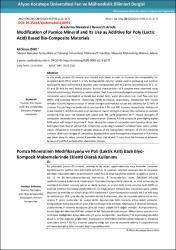| dc.contributor.author | Dike, Ali Sinan | |
| dc.date.accessioned | 2021-10-12T15:32:30Z | |
| dc.date.available | 2021-10-12T15:32:30Z | |
| dc.date.issued | 17.03.2020 | en_US |
| dc.identifier.citation | Dike, A. S. (2020). Türk Pomza Mineralinin Modifikasyonu ve Poli (Laktik Asit) Bazlı Biyo-Kompozit Malzemelerinde Eklenti Olarak Kullanımı . Afyon Kocatepe Üniversitesi Fen Ve Mühendislik Bilimleri Dergisi , 20 (1) , 111-117 . DOI: 10.35414/akufemubid.618993 | en_US |
| dc.identifier.uri | https://dergipark.org.tr/tr/pub/akufemubid/issue/53078/618993 | |
| dc.identifier.uri | https://doi.org/10.35414/akufemubid.618993 | |
| dc.identifier.uri | https://hdl.handle.net/11630/9432 | |
| dc.description.abstract | In this study, pumice (P) mineral was treated with silane in order to increase the compatibility for
poly(lactic acid) (PLA) which is a fully biodegradable polymer widely used in packaging and outdoor
applications. Neat and treated P powders were compounded with PLA at the concentrations of 5, 10,
15 and 20 wt% by melt mixing process. Surface characteristics of P samples were examined using
infrared spectroscopy. Mechanical, water uptake, melt-flow and morphological properties of prepared
composites were investigated by tensile and impact tests, water absorption test, melt flow rate test
(MFR) and scanning electron microscopy (SEM) technique, respectively. Mechanical test results
revealed that the highest increase in tensile strength and modulus values was obtained for 15 wt% of
silanized P containing composite which are found as 4.5% and 40% increase, respectively. Addition of
silane-treated P into PLA resulted in an increase in impact strength of about 33% compared to samples
containing that were not treated with silane with the same proportion of P. Impact strengths of
composites increased with increasing P concentration. Silanized P filled composite gave slightly higher
MFR values with respect to pristine P. Water absorption values of composites were found as about twofold higher than that of unfilled PLA. Composites containing silanized P exhibited lower water uptake
values compared to untreated P samples because of the hydrophobic character of silicon containing
surfaces. SEM micro-images of composites displayed that more homogeneous dispersion in PLA matrix
was taken place for silane treated P particles than that of neat P stem from the increase of adhesion
between P and PLA surfaces after silanization process. | en_US |
| dc.description.abstract | Bu çalışmada, pomza (P) minerali, ambalaj ve dış ortam uygulamalarında sıkça kullanılan tamamen
biyobozunur bir polimer olan poli (laktik asit) (PLA) ile uyumunu artırmak amacıyla silan ile muamele
edilmiştir. Muamele edilen ve edilmeyen P tozları PLA ile eriyik karıştırma yöntemi ile ağırlıkça yüzde 5,
10, 15 ve 20 konsantrasyonlarında eklenmiştir. P numunelerinin yüzey özellikleri infrared
spektrofotometre kullanılarak incelenmiştir. Hazırlanan kompozitlerin mekanik, su alma, erime-akış ve
morfolojik özellikleri sırasıyla çekme ve darbe testleri, su emme testi, erime akış hızı testi (MFR) ve
taramalı elektron mikroskopi (SEM) teknikleri ile araştırılmıştır. Mekanik test sonuçlarına göre, çekme
dayanımı ve modülde en yüksek artışa %15 silanlanmış P içeren kompozitte sırasıyla %4,5 ve %40 artış
ile rastlanmıştır. PLA içine silan ile muamele edilmiş P eklenmesi, silan ile muamele edilmemiş ve aynı
oranda P içeren numuneler ile kıyasla darbe dayanımında %33 civarında artışa neden olmuştur.
Kompozitlerin darbe dayanımları artan P konsantrasyonu ile artmıştır. Silanlanmış P eklenmiş kompozit,
silanlanmamış P eklenmiş kompozite göre bir miktar yüksek MFR değeri vermiştir. Kompozitlerin su
emme değerleri eklentisiz PLA’dan yaklaşık iki kat fazla olarak bulunmuştur. Silikon içeren yüzeylerin su
sevmeyen özelliğinden dolayı silanlanmış P içeren kompozitler, modifiyesiz P ile kıyaslandığında daha
düşük su emme değerleri sergilemiştir. Kompozitlerin SEM mikro-resimleri göstermektedir ki; silanlama
işleminden sonra P ile PLA arasında yapışma arttığı için silan ile muamele edilmiş P parçacıklarında
edilmeyenlere göre daha homojen dağılım gerçekleşmiştir | en_US |
| dc.language.iso | eng | en_US |
| dc.publisher | Afyon Kocatepe Üniversitesi | en_US |
| dc.identifier.doi | 10.35414/akufemubid.618993 | en_US |
| dc.rights | info:eu-repo/semantics/openAccess | en_US |
| dc.subject | Pumice | en_US |
| dc.subject | Poly (lactic acid) | en_US |
| dc.subject | Bio-composites | en_US |
| dc.subject | Extrusion | en_US |
| dc.subject | Polymer composites | en_US |
| dc.subject | Pomza | en_US |
| dc.subject | Poli (laktik asit) | en_US |
| dc.subject | Biyo-kompozitler | en_US |
| dc.subject | Ekstrüzyon | en_US |
| dc.subject | Polimer kompozitler | en_US |
| dc.title | Modification of pumice mineral and its use as additive for poly (lactic acid) based bio-composite materials | en_US |
| dc.title.alternative | Türk pomza mineralinin modifikasyonu ve poli (laktik asit) bazlı biyo-kompozit malzemelerinde eklenti olarak kullanımı | en_US |
| dc.type | article | en_US |
| dc.relation.journal | Afyon Kocatepe Üniversitesi Fen ve Mühendislik Bilimleri Dergisi | en_US |
| dc.department | Seçiniz | en_US |
| dc.authorid | 0000-0001-6214-6070 | en_US |
| dc.identifier.volume | 20 | en_US |
| dc.identifier.startpage | 111 | en_US |
| dc.identifier.endpage | 117 | en_US |
| dc.identifier.issue | 1 | en_US |
| dc.relation.publicationcategory | Konferans Öğesi - Uluslararası - Başka Kurum Yazarı | en_US |



















